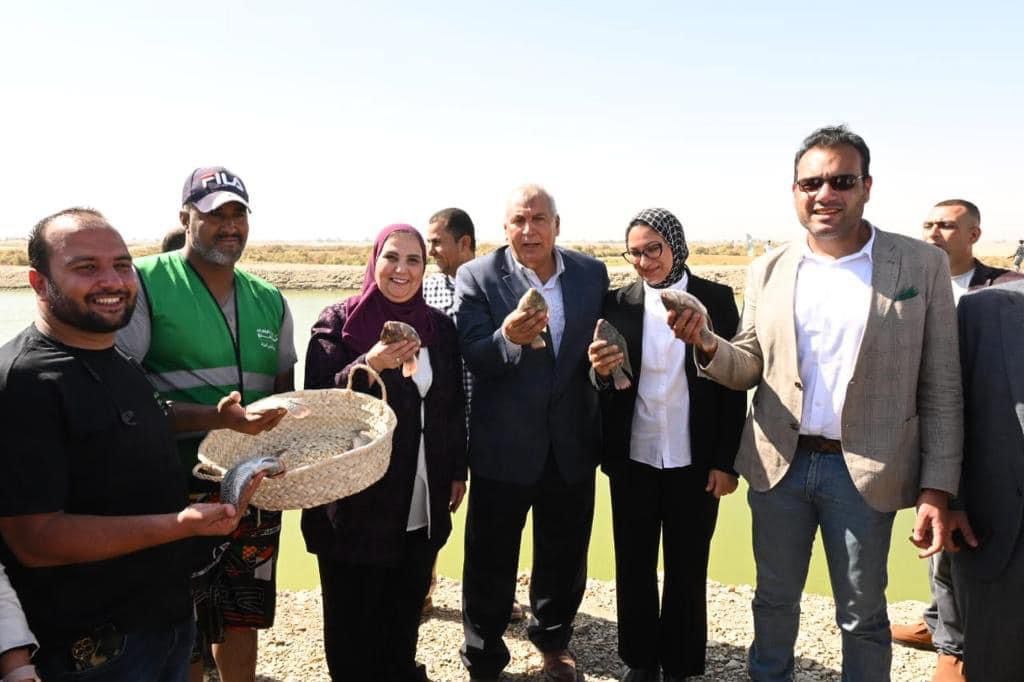The Egyptian Food Bank Inaugurates the First Phase of the Food-Secure Villages Project in the City of Farafara
The Egyptian Food Bank inaugurated today the first phase of the Food-Secure Villages project in the city of Farafara in The New Valley Governorate. This project is the latest in a series of developmental projects by the Egyptian Food Bank aimed at achieving comprehensive sustainable development in alignment with the United Nations Sustainable Development Goals and Egypt’s Vision 2030. The inaugural event witnessed the presence of Dr. Nevine El-Kabbaj, the Minister of Social Solidarity, alongside Major General Dr. Mohamed El-Zamlout, the Governor of The New Valley, and Mr. Mohsen Sarhan, CEO of the Egyptian Food Bank.
This project is part of the Egyptian Food Bank’s strategy to launch comprehensive development projects in partnership with the government and civil society. It aims to provide healthy and sustainable food, as well as a steady and rewarding source of income for beneficiaries from the most vulnerable segments of the population, all while adhering to environmental sustainability standards for resource conservation and environmental preservation.
The Food-Secure Villages project is the first of its kind in Egypt and is designed to achieve comprehensive food security by ensuring the provision of healthy and nutritious food for all residents. The project focuses on a circular economy approach, incorporating agricultural, animal husbandry, and poultry production to meet the essential nutritional needs of the project’s beneficiary communities. It also implements environmental sustainability standards for resource efficiency and soil preservation, as well as recycling waste materials for economic returns and fostering greater workforce opportunities.
The project is built on four pillars of food security which are availability, access, utilization and stability. To achieve these objectives, the project aims to expand cultivated areas in the city of Farafara by reclaiming 1,500 acres of land and establishing 30 agricultural greenhouses. Additionally, it will support and empower 1,000 small-scale farmers to enhance productivity and improve pre-and post-harvest processes. Furthermore, agricultural equipment and guidance will be provided to 300 irregular agricultural workers to enhance their income, ultimately contributing to the provision of essential food products to the city’s residents and its surrounding villages. These products will be distributed through various outlets, or to supply the central kitchen of the Egyptian Food Bank, which provides nutritious meals for children.
Furthermore, The Food-Secure Villages project aims to establish agricultural manufacturing projects to increase the yield of agricultural crops. It includes a facility for managing agricultural waste to produce feed for poultry and livestock projects, which will support 300 poultry farmers and create three fishponds, each with a capacity of 50,000 fish seed. The water from these farms will be used for irrigating agricultural greenhouses, promoting natural resource efficiency and ensuring the project’s holistic integration and sustainable development.
Since the launch of the project at COP 27, the Egyptian Food Bank has successfully established a fisheries covering an area of one acre, producing 21 tons of fish annually, with locally sourced feed. The farm’s water will be used for irrigating vegetable and fruit crops to meet the basic nutritional needs of the city’s residents.
Additionally, the Egyptian Food Bank has inaugurated a central kitchen in the village of Al-Kifah, fully equipped with the necessary machinery and equipment to produce 6,000 healthy and cooked meals daily. These meals are intended to serve eight primary schools and nine nurseries in the region. The kitchen adheres to strict environmental and health standards, as well as safety measures, to ensure the provision of nutritious meals tailored to the beneficiaries’ nutritional requirements, in accordance with the recommendations of the National Nutrition Institute.
During the inauguration ceremony, Mohsen Sarhan, CEO of the Egyptian Food Bank, signed contracts with small-scale farmers to increase productivity and improve pre-and post-harvest processes, he also handed over projects to support small poultry breeders. Furthermore, the Egyptian Food Bank distributed agricultural equipment to 100 irregular laborers who do not own land, with the goal of helping them secure a steady source of income. Moreover, the Egyptian Food Bank launched a convoy encompassing 2,000 box of foodstuffs for distribution to the most vulnerable groups.
“The Food-Secure Villages project embodies all the pillars of the Egyptian Food Bank’s strategy, including protection, prevention, empowerment, and enhancement, with the ultimate goal of achieving self-sufficiency and food security. This project directly benefits 8,000 citizens of Farafara’s villages and indirectly impacts 43,000 more. It serves as a comprehensive developmental intervention within a defined geographic scope to maximize sustainable value and impact. The project adopts a collaborative approach by partnering with the Ministry of Social Solidarity, the governorate, and grassroots associations.” Said, Mohsen Sarhan, CEO of the Egyptian Food Bank.












التعليقات مغلقة.